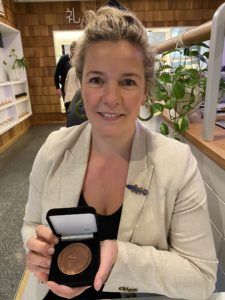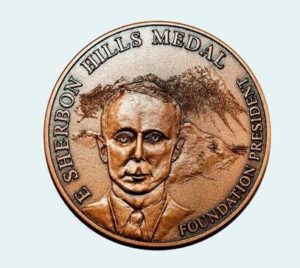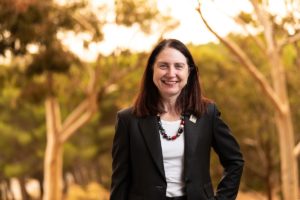
Dr Alice Clement wins the Australian Geological Society’s highest prize for geological scientists aged under 40, a Flinders review of Gayle’s Law is tabled in Parliament, and law lecturer Robert Chalmers has crucial input into regulatory thinking on Artificial Intelligence.
Top medal for outstanding geological scientist

Evolutionary biologist and palaeontologist Dr Alice Clement – one of the 2020 SA Tall Poppy in Science Award winners – has now been awarded the E.S. Hills medal for 2021 from the Geological Society of Australia, being its highest honour for geological scientists aged under 40. This medal – named after prominent Melbourne-born professor and Edwin Sherbon Hills – is awarded to an Australian resident for making an outstanding contribution to any branch of the geological sciences, anywhere in the world. It is not awarded each year, and was last awarded in 2018. Dr Clement’s win was announced during the virtual meeting of AESC (Australian Earth Sciences Convention) in February, but was awarded to her in person at the recent Geological Society of Australia (SA branch) AGM in May.
 Dr Clement is an internationally respected Australian geoscientist who researches palaeontology and vertebrate evolutionary biology, becoming a world leader in the study of fish evolution and paleoneurology (fossil brain research).
Dr Clement is an internationally respected Australian geoscientist who researches palaeontology and vertebrate evolutionary biology, becoming a world leader in the study of fish evolution and paleoneurology (fossil brain research).
Along with pioneering new techniques, her work adds important data to knowledge of Middle to Late Devonian and Carboniferous fauna and paleo-environments, including documenting anatomical changes between fish and early tetrapods.
Alice first gained international experience during a postdoctoral position at the leading Per Ahlberg Lab at Uppsala University in Sweden (2013-15) where she worked with micro-computing tomography (CT) and synchrotron data on both fossil and extant fishes, and developed methods for the analysis of large 3D datasets. She returned to Australia in 2016 to start a second postdoctoral position at Flinders University. During the Uppsala postdoc, De Clement had an invitation to visit South Africa to work with Dr Rob Gess at Rhodes University there. She also cites last year’s Nature paper (Cloutier, Clement et al, 2020) with Professor John Long, as another career highlight so far. She is a currently research leader working on a Virtual Australian Museum of Palaeontology and co-authored an ARC-funded Discovery Project in 2020 ‘Brains Frozen in Time’ (DP200103398, $408,000), based on her specific paleo-neurobiological expertise.
Review of Gayle’s Law tabled in Parliament
The independent review of Gayle’s Law conducted by the Deputy Director Rural and Remote Health Professor Robyn Aitken, from the College of Medicine and Public Health, was tabled in the SA Parliament last week. Gayle’s Law was enacted to improve the safety and security of remote health workers in response to the tragic death of Gayle Woodford, a dedicated nurse who was murdered while working in a remote community in South Australia.

Professor Aitken, along with Flinders research associate Dr Lesley Siegloff and Ms Marcia Hakendorf, examined how well the Act is working ‘on the ground’, and whether in its current form it has achieved the intention of providing better protection for health practitioners working in remote areas of South Australia, and minimising risks to their personal safety.
“It was good to find that Gayle’s Law has mostly been implemented as intended and largely successful in ensuring greater safety for health professionals attending unscheduled and out of hours callouts in the remote areas covered by the Act and Regulations,” says Professor Aitken. “Health services have policies and procedures in place to ensure that health workers are no longer placed in situations where they are providing health care on their own under the circumstances described in Gayle’s Law. Some health services have even gone further than the legislation, and we recommend that these extensions are adopted more broadly.
The Minister for Health and Wellbeing, Steven Wade, welcomed the findings of the independent review noting that the findings that there are opportunities to strengthen and simplify the operation of Gayle’s Law to ensure its continued success. The Government will now formally consider and respond later this year to the 18 recommendations made by Professor Aitken and her team.
Flinders contributes to regulatory thinking on Artificial Intelligence
The Australian Human Rights Commission’s final report on Human Rights and Technology was tabled in Federal Parliament last week. Robert Chalmers, Lecturer in Law, contributed submissions to the AHRC review over the past two years and was also included in discussions during its development by Human Rights Commissioner Ed Santow. Robert’s contributions were cited over 30 times in the report. Submissions made by Flinders Juris Doctor students (now graduates) Martha Browning, Megan Ellis, Kelly Yeoh and Claire Devenney and Chris Mills as part of their studies in LLAW9616 Clinical Legal Education are also acknowledged in the report.
The report is an important step towards the creation of regulatory frameworks that guide technology development so that it respects human rights. It covers issues such as how to promote better protect human rights in the development and use of AI-informed decision-making systems, and recommends the establishment of an AI Safety Commissioner. Flinders staff and students are involved in many areas of research that translate into significant impact, and this is another example of the diversity of that work.
National Microbiology honour
As part of its 2021 awards, the Australian Society for Microbiology has announced a Distinguished Service Award for Professor Melissa Brown, Flinders University’s Professor in Microbiology within the College of Science and Engineering.

